"Travel opens eyes to the world as it is." I leave the Middle East, and especially Israel, not really comprehending all I saw and think I learned! What is the world here really like? Months after leaving, I am still digesting information garnered from my travels there. One thing I know is, the ancient Middle East is a complex -- but AWESOME -- place!
I would love to tour the entire Middle East, and had Turkey on my itinerary. But, while planning the tour, the country started experiencing terror attacks and devolved into political turmoil. I was not so much afraid of getting caught in a terrorist attack. I didn't want to deal with all the increased security measures. Other countries were just in too much turmoil, or have governments not friendly to the U.S government. So, I decided to only tour Jordan and Israel!
I saw incredible landscapes, unbelievable historical sites, and revered religious monuments thousands of years old, that have survived wars and natural disasters. Of, course many more have been destroyed and more are still being destroyed.
RELIGION
War walks hand-in-hand with religion and land resources. And, I don't think religion plays a bigger roll in any society than in Israel. I witnessed public conflicts between Christians and Jews and Muslims and non-Muslims. Each group was guilty of being the instigator at times.
Israeli law guarantees equal rights to Jews and Arabs. There is often a 2-way system to afford each group some control. Like, the Muslims have control over the Temple Mount and make the rules, which the Israeli Military enforces. But, Israeli law guarantees everyone access to the Mount. So, the Muslims allow anyone on the mount, but they determine the entrance point and set certain hours non-Muslims may visit. They do not allow non-Muslims to enter the Dome of the Rock. This system is also in place in Hebron, where Arabs make the laws but Israeli soldiers enforce them.
Israel seems like a country with citizens living in two societies. Arab and Jewish children attend
different schools where they wear their specific religious attire and learn in Hebrew or Arabic.Of the 1.6 million total students in grades 1 through 12 last year, fewer than 2,000 attended the handful of joint Jewish-Arab schools. Students in these schools seem to excel academically and form good friendships with each other, regardless of being Jew or Arab.
MY TIME TO OPINE!
Israel's citizens, of course, consist of both Arabs and Jews. But, the two groups mostly live in separate cities. Even in the large cities, like Jerusalem and Haifa, with large numbers of both groups, they live in separate neighborhoods.
This self-imposed segregation comes from deep seated factors such as language, culture and religion. The same mind set is in American society, and other countries with diverse populations. In America there are Vietnamese neighborhoods, China Towns, Mennonite communities, etc. Rather than assimilate into the larger society, like-minded people often choose to balkanize into separate locations, even though Federal laws guarantee anyone may live anyplace or attend any school, etc., of their choice.
Balkanization might work fine if the activist and radicals didn't often use it as a tool to fabricate discrimination and raise tensions, such as "(_____) schools not as good, income not as high as(_____) ". I also think news media and political parties often encourage unrest and division in order to gain viewer ratings and political votes! But, I guess if people balkanize into separate neighborhoods, or assimilate into the larger society, it is up to them. But, as in all choices, they must accept the consequences.
Some people are shocked if you want to visit "a racist country like Israel". They talk about the walls and separation of citizens. From what I know the Separation Wall between Israel and the Palestinian Territory was built because of the terror attacks from the Palestinian West Bank, by Hamas. The Wall is an inconvenient barrier for both Israelis and Palestianians. But, a government has a duty to protect it's citizens. There is always debate if the decisions the governments make are the right ones or too little or too much.
But, like with the long security lines and prohibited items at airports, these inconveniences, put in place by governments, result because of small groups of extremists from both sides. Here's an idea. Maybe protests should be against those creating the problems, rather than those trying to solve or manage the problems!
It's the ordinary people -- outside the activist, terrorist groups, and decision-making authorities -- that suffer the consequences. The Israelis and Palestinians both have valid grievances and strong convictions.
People around the world seem to be either Pro-Israel or Pro-Palestinian. I can't say my stance has changed after my short 5 weeks here. But, I can say I understand the difficulty of solving the issues slightly better. My mind has been enriched to the problem, but not enlightened to a solution! I leave Israel with lingering sadness for a people living with such divisiveness in their society.
"The more I traveled the more I realized that fear makes strangers of people who should be friends.” – Shirley MacLaine
You might expect The Holy Land, where so much religion is on public display, to be like being in
one large loving religious retreat. Christians stand on street corners with open Bibles, Jews dress in Kappas or complete Jewish outfits, and Muslims bow in public and pray several times daily. But, I don't see much love and tolerance on display. I guess as humans it is difficult to temper our convictions with compassion. Even with all the religious sites I visited, it was difficult to feel "spiritual". I guess it's just my way of believing "Godliness" is demonstrated more in how you treat others than in how many religious rules you can keep.
SOME CLOSING OBSERVATIONS
Jordan:
A much more relaxed country than Israel. Islam makes up 97.2% of the population. Maybe this is why. There is not as much diversity to deal with. Here, the people are slightly more at ease, in a controlled sort of way. Overall, Jordan was enjoyable, with only a couple of small issues. Both entering and leaving Jordan was simple.
Israel:
I felt very unwelcome in the Orthodox Jewish neighborhoods. Mostly I was just ignored and felt snubbed.
In the old city Quarters, the Jewish business people welcomed me to shop, and were even aggressive, in hopes of making a sale. The Muslim market places seemed to tolerate me. Both tried to scam me on occasion. Several times, in Muslim areas, my path was blocked in an aggressive, physical way. The Christian Quarter was just open to anyone to browse and buy or not. I didn't have any issues there.
I like to meet locals to get to know and learn from. But, in the 5 weeks in Israel, it didn't happen. Locals didn't even make eye contact. Everyone is so guarded here. It always felt to me like a tightly wound rubber band - ready to break! But, this was my experience, maybe if you visit you will feel different, and I hope the locals don't feel this constant tension in their daily lives, but I don't know!
Maybe it was just me, not being accustomed to so much military and police presence, restrictions, and security checks. Or, maybe the aloofness or guarded attitudes are just part of the culture? I don't know enough to judge, and that is not what I travel for! I just write what I experience.
Entering and leaving Israel was both difficult. I was grilled extensively entering Israel. I had to show my itinerary and answer questions about my plans to visit Bethlehem, in the Palestinian territory. I could not get a boarding pass to leave Israel until I met with a supervisor and explained why I was flying to a different country than the U. S., because of my American passport. I had to explain where my travel funds came from, also.
Nevertheless, although I felt the constant friction in the land, and was aware of possible danger at any time, I was never afraid, and went freely on my own, all over Israel. (The tension, real or percieved, I felt, was not between myself and the locals, but between the locals.) I would travel alone again, not in a tour group. But, that is just my preference. Most people would prefer to travel in a group, I'm sure. There are pros and cons for both.
WHAT I FEARED MOST IN THE MIDDLE EAST
What I feared most traveling in the Holy Land was --- DRUM ROLL PLEASE--- the tour groups!
Get behind them and you wait for the guide's speech to end, everyone to take their turn seeing the site (and maybe praying), discussing it with their neighbor, then taking their photos (that had to be just perfect)! If at a restaurant, just leave, or you will get VERY hungry.
From Tel Aviv, I fly to Thailand, via Uzbekistan, now a sovereign country. It was part of the former Soviet Union until it broke up in 1991.

 Tashkent, Uzbekistan
Tashkent, Uzbekistan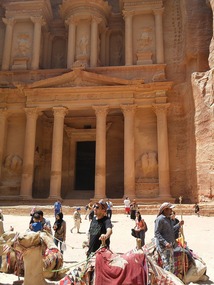
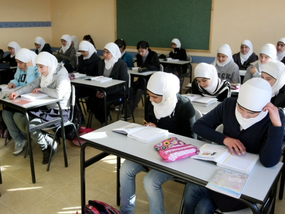
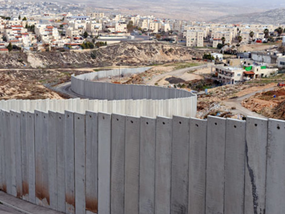
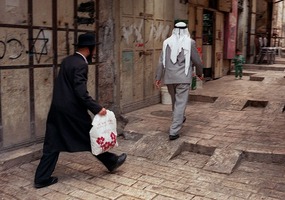
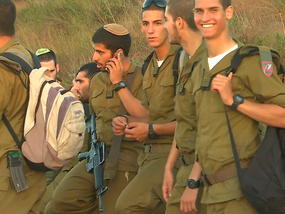
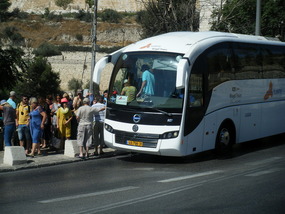



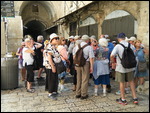
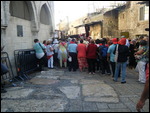
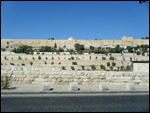
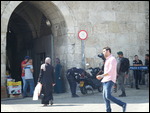
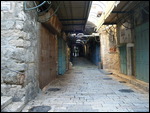
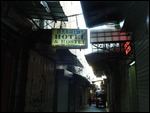
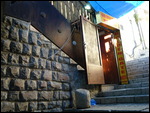
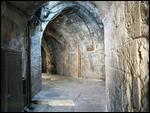
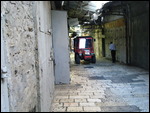
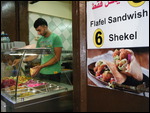
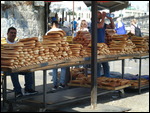
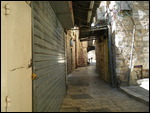
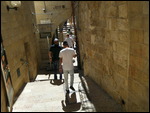
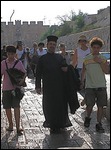






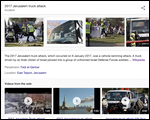



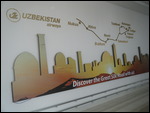
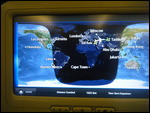
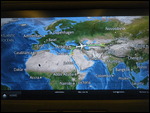
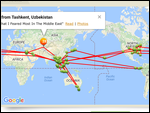

2025-05-22